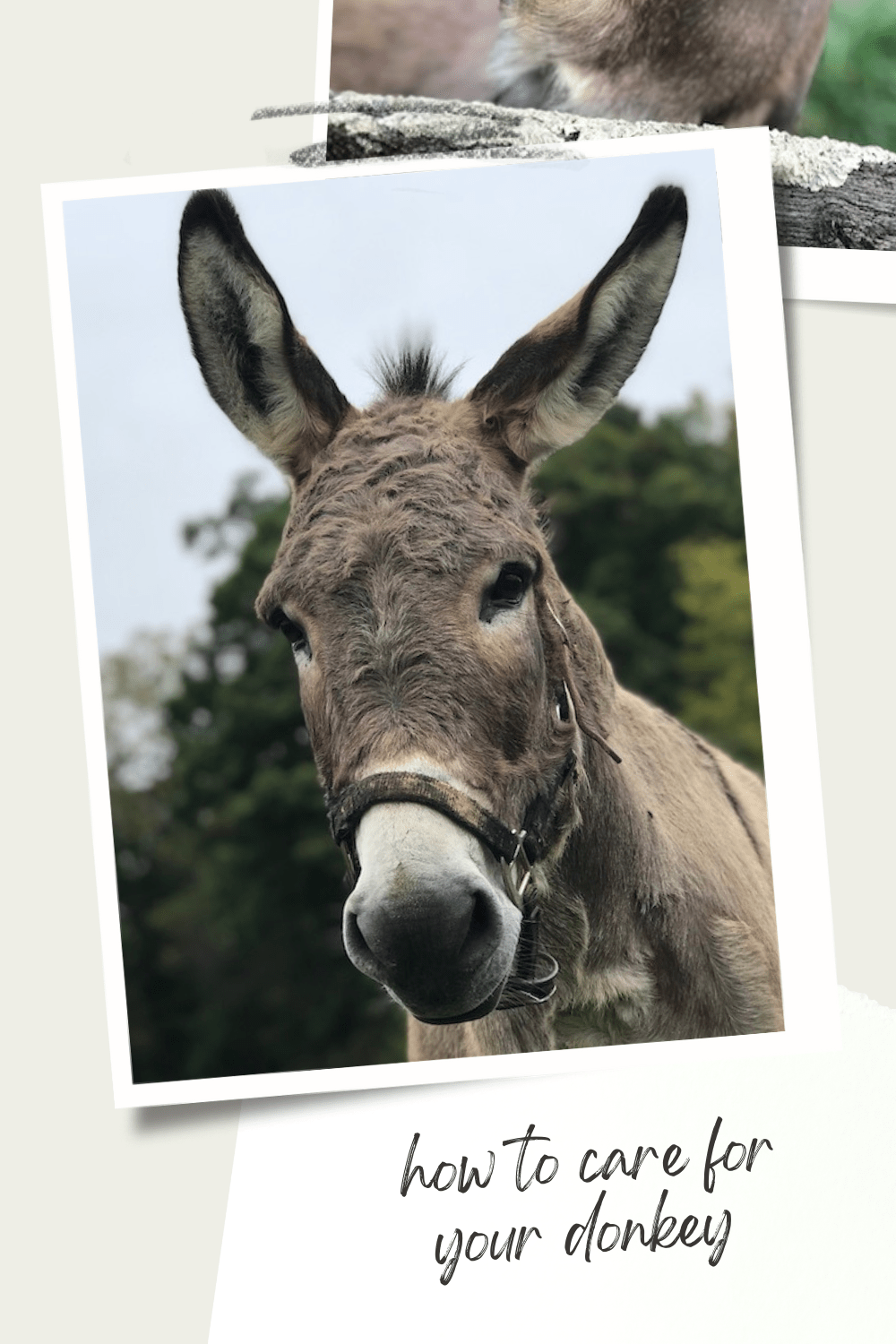
How to Care for Your Donkey – A Homesteader’s Guide
Whether for companionship or guarding a herd, donkeys are a great addition to any homestead or farm. This guide will walk you through how to care for your donkey and all the reasons why you need one on your homestead.
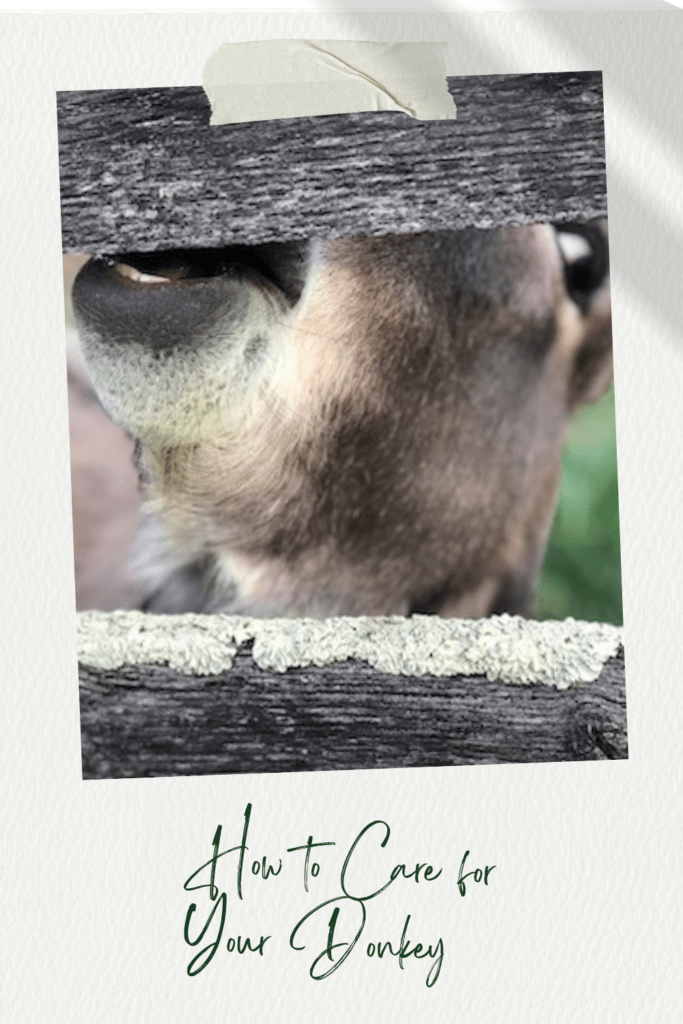
When we purchased our homestead in 2020, I knew one thing for certain. I wanted a donkey.
To be honest, I am not sure at the time if I knew why I wanted one. All I knew was they were cute little critters and once I set my mind to something, there is very little that will change it.
So we started looking, and my husband found Archie.
Since, we have learned so much about donkeys, their behavior, and how to care for them.
Today we are going to share those learnings with you in this comprehensive guide for homesteaders on how to care for your donkey.
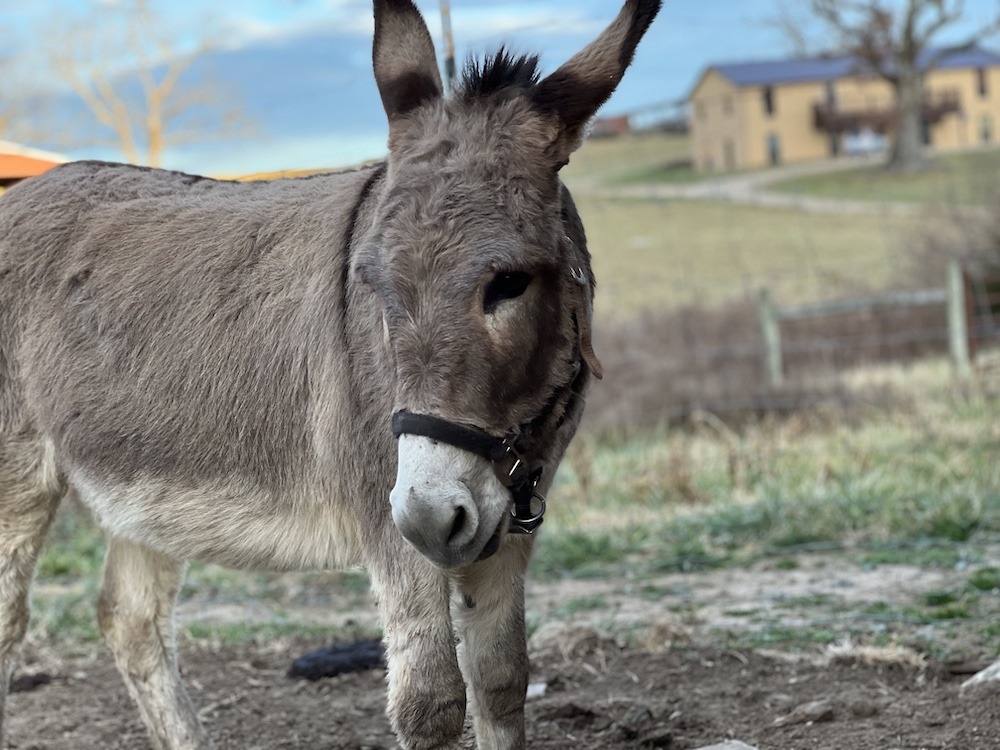
Why Donkeys are great for the homestead?
I am a firm believer that everything has a purpose on a homestead. If it doesn’t have a purpose, it doesn’t get to be a part of the homestead. And Archie, our donkey, is no exception.
Donkeys are great additions to any homestead because they are exceptional guard animals.
We live in an area where you can hear coyotes on almost a nightly basis. With future calves and other small animals that will be joining our homestead, we have to think of ways to keep them safe.
Archie is one of those ways.
Donkeys have a deep-seated dislike for canines of all kinds. This instinct along with their territorial nature and herd mentality makes them a great deterrent for coyotes.
While Archie is not a fan of our dogs, he has learned to tolerate them as long as we are in the field with them.
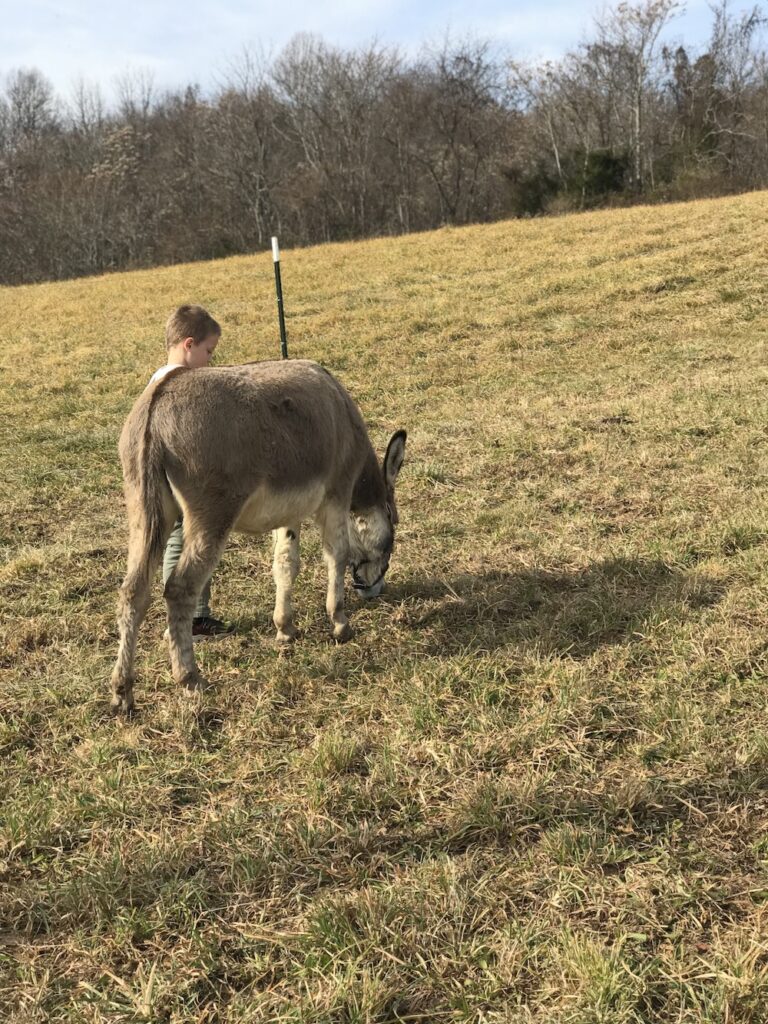
Donkeys make great companion pets. They are loyal and affectionate with big personalities!
Donkeys are also great pack animals.
They can be used similarly to horses and be used to pull or carry items around the homestead. Some homesteads use a donkey in place of small farm equipment.
Did You Know?!
A donkey can pull up to 2x its body weight!
Where do I get a donkey?
While there are donkey breeders out there, we recommend rescue. Donkeys have a long life span and owners often do not take into consideration the commitment of owning a donkey. This results in a lot of donkeys becoming homeless.
There are a lot of great options to adopt rescue donkeys that have been surrendered by their owners.
While rescue centers like Peaceful Valley Donkey Rescue do not adopt out for livestock guarding purposes, they are a great place to start your search. You can also check out the Farmette for adoptable donkeys or local newspapers, livestock markets, or social media pages.
Never buy a donkey blind. Always take the time to ensure a good fit before purchasing or adopting a donkey. This is a life long friend folks. You want to make the right choice for you and the donkey.
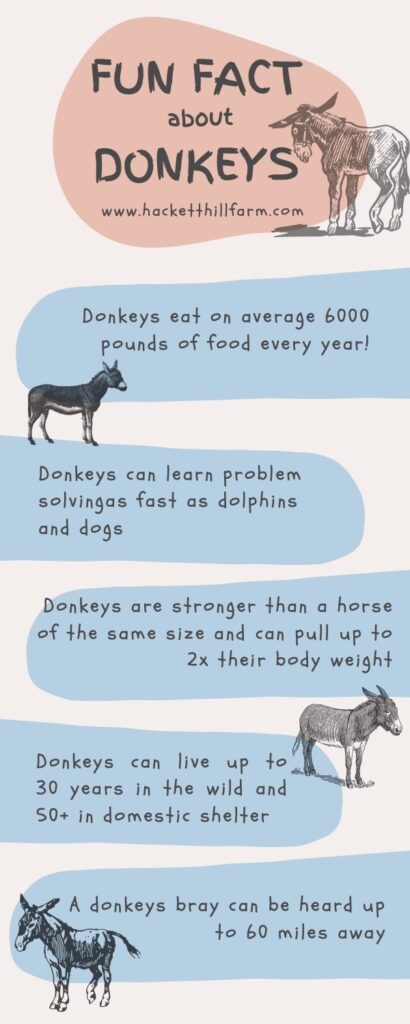
What to Consider before getting a donkey
Cost of a donkey
Donkeys are fairly easy to find, but often times come with a price tag of around $150 to $300.
We were lucky enough to find Archie from a local that was willing to surrender him to us due to a change in their housing situation.
Most rescues will only adopt out pairs if you do not currently own a donkey. Donkeys are social creatures and can get lonely if left on their own. This can drive the cost of purchasing a donkey up, but it the long run is better for the wellbeing of the donkey.
You should never separate bonded pairs. Separating bonded pairs can be detrimental to their health causing loss of appetite and extreme distress.
Archie had been alone for almost four years prior to us getting him. We ended up having to socialize him with the cows because he didn’t know how to interact.
After a long process, he is now doing great with the cows.
Did You Know?
Donkeys can Eat up to 6000 lbs of food a year!
The cost of a donkey is more than just what you will spend in a the cost to obtain. You should also take into consideration veterinary visits and food intake. While these costs vary year to year and depend on the amount of land you pasture your donkey on, you can expect to set aside around $1000 to $1500 a year in health, food, and entertainment.
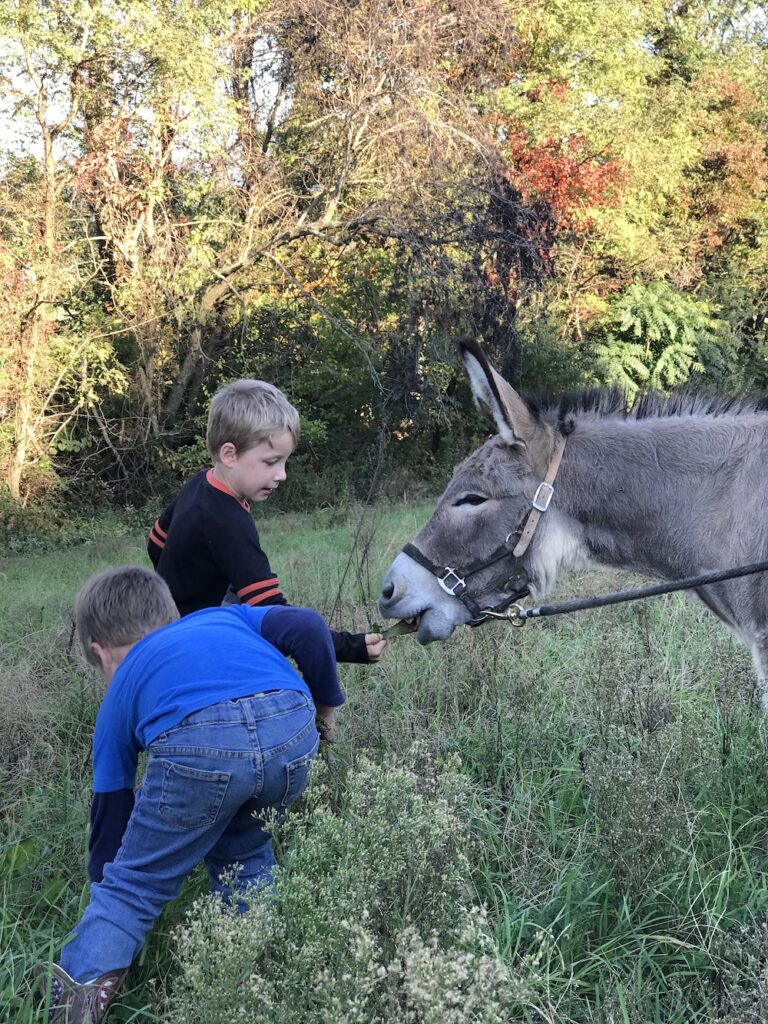
What is the average lifespan of a donkey
Donkeys live long lives. Most donkeys can leave up to thirty years or more!
When making the decision to get a donkey, understand this is a long term relationship.
Donkey personalities
Donkeys are complex characters. They are highly intelligent and have a high propensity for affection with humans once trust has been established.
Donkeys have a strong sense of self preservation so it will take a while for a donkey to warm up to you. Once they know they can trust you, they will warm up and begin showing affection.
Donkeys are characteristically gentle and very loyal.
Are Donkeys stubborn?
You may have heard the word stubborn associated with donkeys, however that may not be an accurate depiction of a donkeys true nature.
Donkeys have a natural reaction to freeze when frightened or threatened giving into the misunderstanding that your donkey is being stubborn. This reaction may also show that the donkey does not understand what you need or what it to do.
It is important to understand the underlying cause of the reaction in order to understand your donkey.
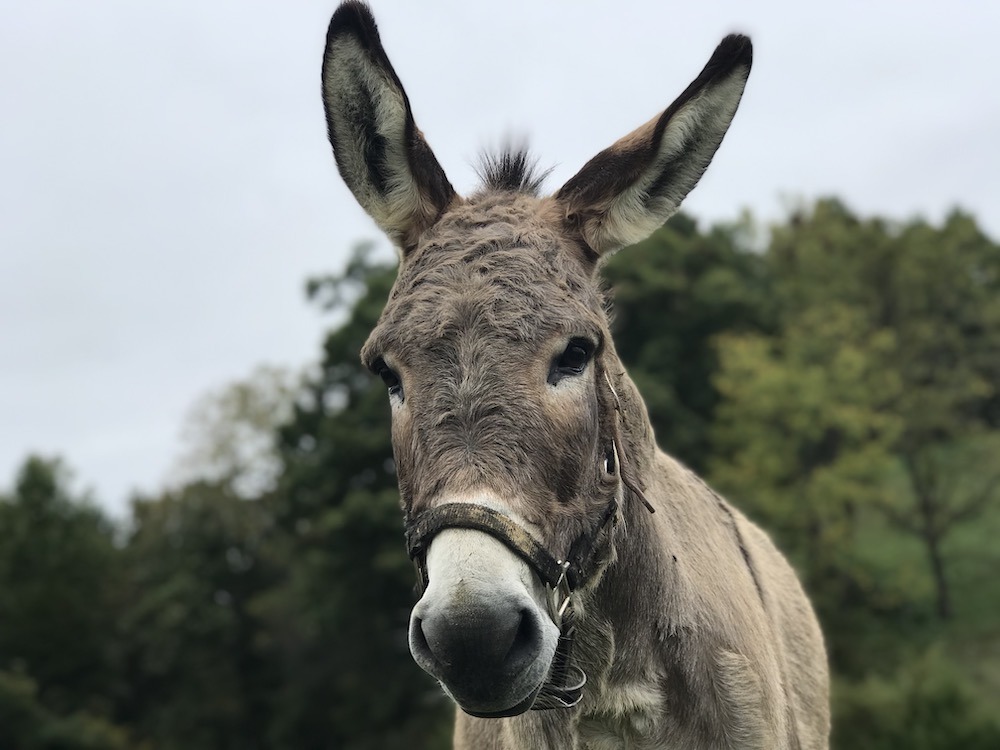
Are Donkeys Smart?
According to a 2013 study conducted by the Donkey Sanctuary, donkeys can learn at the same pace as dolphins and dogs!
Donkeys are highly intelligent and have been found to be great therapy animals. They have been especially useful with autistic children.
Yet one more reason to have these lovely creatures around.
Why do donkeys bray?
Donkeys bray for a litany of reasons. Each donkey has its own unique “vocabulary” and will sound off in varying ways to warn of danger, seek attention, and communicate.
Archie has a very distinctive bray when he feels like he is being ignored and he wants to be petted or fed.
He will also bray or hee haw when he hears my husband’s truck or side by side, telling us that he has missed us and wants us to come and hang out for a while.
A donkeys bray can be extremely loud and can carry up to 60 miles if conditions are right.
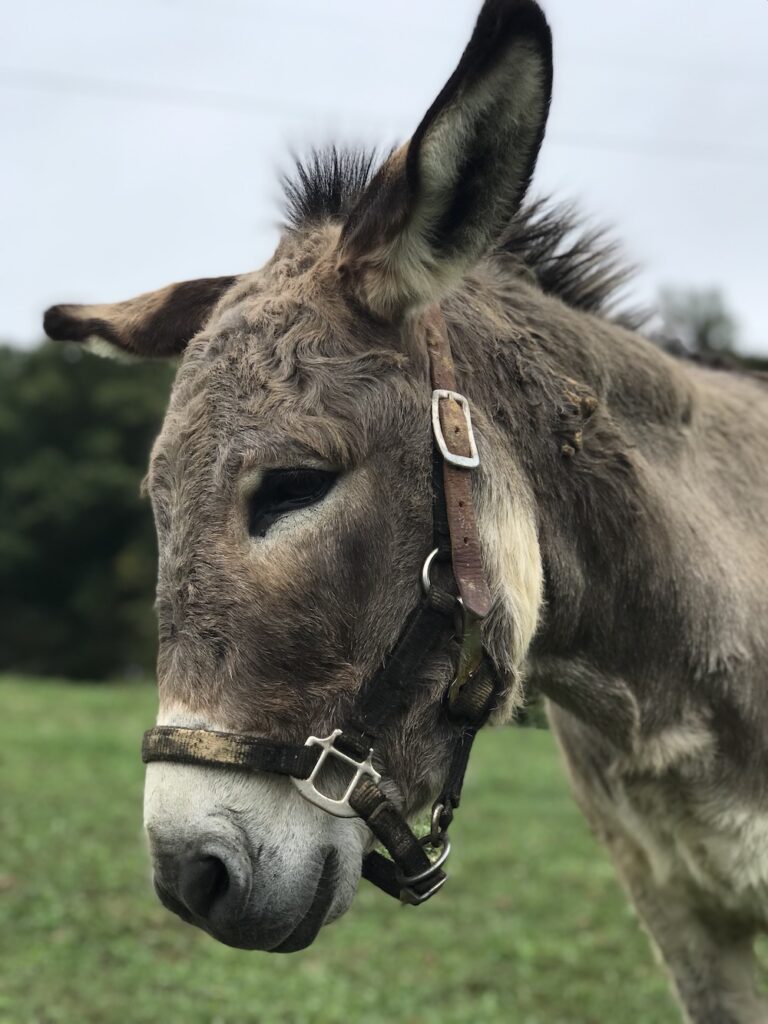
How to donkeys play?
You may be surprised to know that donkeys love to play and can be very silly creatures. This is a far cry from the usual depiction of Eeyore the sad donkey on Winnie the Pooh.
Donkeys love to play ball, throw around old buckets, run and kick, and do all sorts of things!
We keep a ball in the pen with Archie at all times so he can play as he will. It is always so much fun to get in there and play with him.
Check out Archie’s Favorite Ball here!
What do Donkeys Eat
Donkeys can eat quite a bit! On average a donkey consumes around 6000 pounds of food each year.
What kind of food are they eating?
Straw is the closest food source to what donkeys would eat naturally, but hay is a good source of energy for a donkey as well.
They also love the occasional treat like carrots, bananas, apples, or pears to name a few.
Be cautious as donkeys can easily become overweight. They are grazers and will eat as much as you allow them to. Manage their access to high energy grains and treats to keep them in check and healthy.
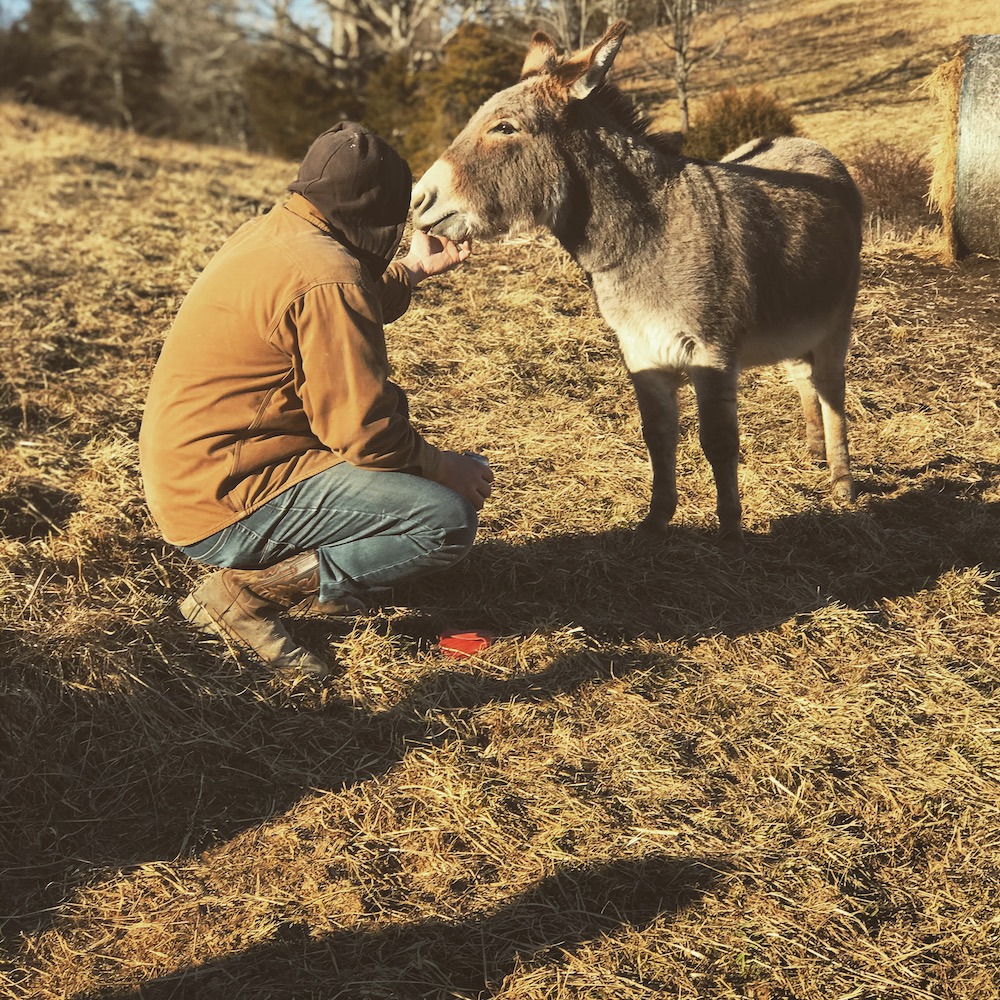
What Kind of Bedding and Shelter do Donkeys need
Donkeys are much lower maintenance than horses in that they do not need as much shelter as a horse does. Horses often have to be led in at night where a donkey will come in if they are cold on their own.
You do not need to blanket your donkey. Nothing saying you can’t, just that there is no need to as long as you have a shelter for them to get in out of the wet and cold.
Shelter can be a barn stall or a three sided lean to. Your donkey just needs a place to get in out of the weather.
Remember donkeys are smart, they will come in if they are cold.
For bedding, we use straw to give him a nice place to lay down.
How much space do donkeys need?
For a stall or shelter, donkeys do not need much space. For a single donkey a ten by ten stall is more than sufficient. They need enough space to turn and lay down if they wish.
A standard donkey does need pasture land and space to run and play. While horses require a little more space, donkeys can be more than happy on an acre of land.
Donkeys, unlike horses, will play around and do not need as much room to “stretch their legs” if you will.
This makes donkeys, especially miniature donkeys, a great addition to the small homestead.
Medical Needs of a Donkey
Just like any other domestic animal, donkeys need routine veterinary care. Donkeys will also need to have their hooves and teeth cared for as well to keep them in the healthiest condition possible.
What vaccines do donkeys need?
Donkeys need regular worming. Most wormers come in a paste or granule form and are based on the weight of your donkey. Typical wormers are recommended for every 8 to 10 weeks. Check with your vet to get their recommendations on type, frequency, and dose.
Donkeys will also need tetanus and rabies shots annually. It is also recommended that donkeys receive vaccines for Encephalitis and West Nile virus. Partner with your vet to understand their recommendations and any other required vaccines for your area.
Check out these wormers for your donkey
How often do donkeys need their hooves trimmed?
You can expect to have a donkeys hooves trimmed around once every three months. This really depends on the environment your donkey lives in however.
The Donkey Sanctuary has a great resource to understand basic hoof needs for your donkey.
How to care for donkeys teeth
Just like humans need to go every six months for dental check ups and cleaning to keep healthy teeth, donkeys also need to visit the dentist.
Donkeys will need to have their teeth floated about once a year. This means that any sharp edges will be filed down. By having flat teeth, your donkey is better able to grind their food which aids in digestion.
How to Care for your Donkey through the changing seasons
As the seasons change, so do some of the care routines for your donkey.
How to care for your donkey in winter
With night time temperatures dropping and freezes on the way, it is important to understand the special needs of a donkey in the winter.
Donkeys are desert animals and while they are well equipped to live outside, the wet cold damp environment we live in can cause pneumonia in your donkey.
To keep your donkey healthy and happy in the lower temperatures follow these tips
- Ensure they have access to shelter to protect them from wet or cold
- Have clean fresh bedding for them to lay in and keep them warm at night
- Provide your donkey with clean warm water for drinking as donkeys are less likely to drink icy water leading to potential dehydration
- While my donkey would hate it, your donkey may love a warm blanket on chilly days.
How to care for your donkey in spring
Spring time is a beautiful time of year, but can bring some very specific issues for your donkey.
Grass is not part of a donkeys natural diet or environment. Over consumption of the lush green grasses of spring can cause bloating, insulin resistance, obesity, as well as colic and diarrhea.
Spring grass can also cause issues with your donkeys hooves known as founder or laminitis.
This painful hoof disease that can cause the hoof to separate and die due to lack of blood flow.
Not only is this disease extremely painful for your donkey, but it could cost him his life.
To avoid founder in your donkey follow these tips
- Limit free grazing time on lush spring grass
- Keep hooves well trimmed
- Restrict the pasture area they have access to by fencing off a small portion into a paddock
- Do not allow donkeys to graze during prime sugar times of the day like early morning. During these times, grasses have the highest sugar content
- Keep daily checks on your donkey taking note of any changes in stance, appearance, or behavior. Call your vet right away if you suspect founder
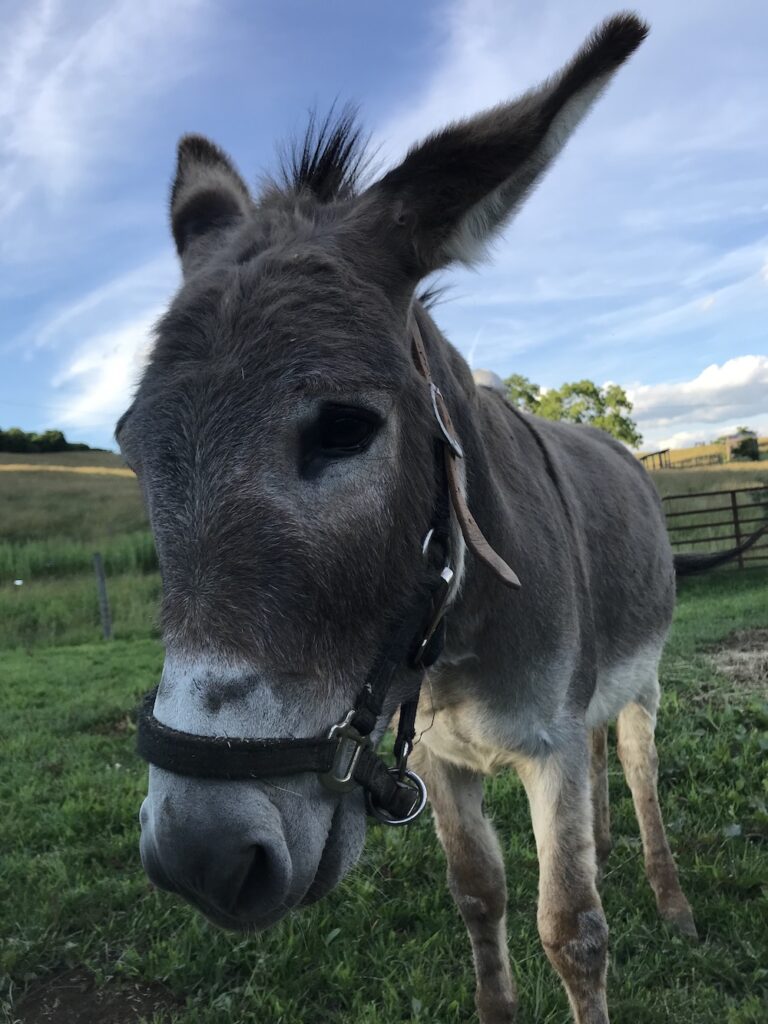
How to care for your donkey in the summer
Your donkey will love summer the best of all because it is most like their natural environment.
To keep your donkey safe and happy, ensure they have access to clean water and a shelter on extremely hot days. Your donkey will decide when he needs shelter, but they were made for the heat.
Continue to ensure your donkey is kept up with all deworming and vaccines and enjoy the summer with them.
Should You Add A Donkey To Your Homestead?
Personally I could not imagine our homestead without Archie. He brings a level of personality to the homestead that we wouldn’t have any other way.
Hopefully this post has armed you will all the information you need to make an informed decision on whether or not adding a donkey or two to your homestead is right for you.
If you know anyone that is looking to get a donkey and you think this post may be helpful, be sure to share it with them!
You can also keep up with Archie and the farm animals on Instagram!
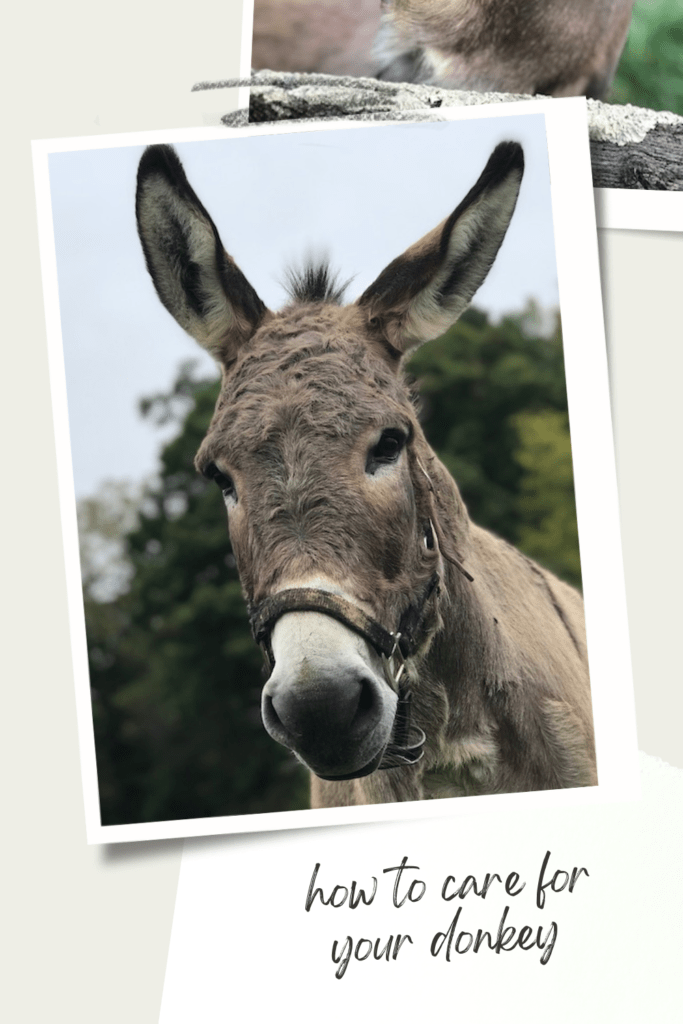
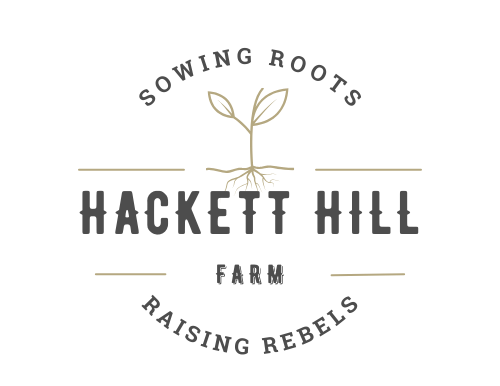

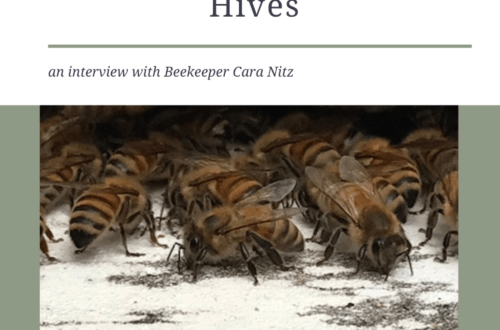
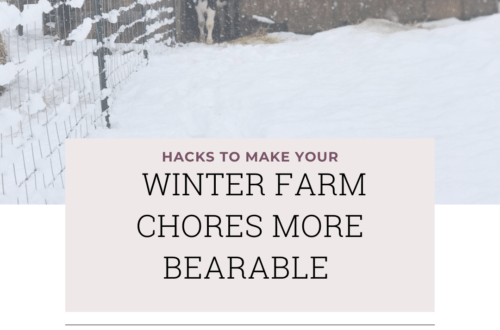
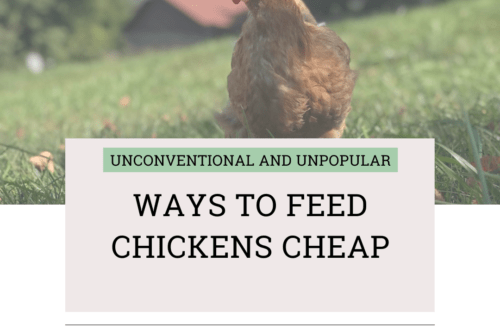
8 Comments
Jess
Holy smokes! I had no idea donkeys could live for 30 years! With such a long lifespan, they’d definitely be worth your investment. I have a flock of chickens that get terrorized by raccoons every summer…. Would a donkey help keep raccoons out of my yard?
hacketthillfarm
If you are looking to get a donkey for smaller livestock, you will want to stick with a miniature donkey. Standard donkeys could injure smaller animals by accident when they are playing. A miniature would be a good solution to put with chickens, sheep, or any other small livestock. You may also want to consider Guineas as they are great alarm systems.
Kayla
So much information. I’ve been wanting a donkey (my family teases me for it). But I think they’re cute and with wanting to have a little farm I’ve been wanting one for guarding. This post just gave me so much more knowledge that I didn’t realize. Makes me want one even more lol.
hacketthillfarm
I Love Love Love having Archie. If you decide that a donkey is right for you and you have any questions, do not hesitate to reach out!
Karla R Petersen
This was a very fun read and I learned a lot. I’m not a homesteader, nor have any plans to own a donkey, but I love all of God’s creatures. And one line hit me in the heart! “It is important to understand the underlying cause of the reaction in order to understand your donkey.” I have been a foster mom for over 30 years and this is the mantra we have with children of trauma. We all need to trust those around us in order to live genuine lives!
hacketthillfarm
yes I agree 100% trust is so important for building meaningful relationships for humans and animals alike. Thanks so much for stopping by!
Stuart Danker
I had no idea I’d come across an article on caring for your donkey on WordPress, but here I am, much more enlightened than before I stumbled in. Lovely post and pics, and what a cute donkey! Thanks for being so educational!
hacketthillfarm
Thank you so much! I am glad you found it educational. We love our donkey Archie. He really is the best!